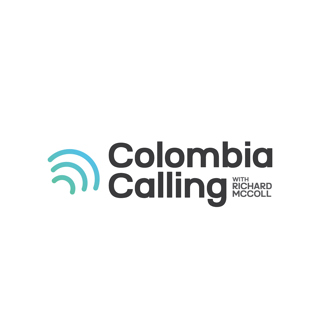
492: Made of Space Dust
Colombia's leading astronomer, Dr Paola Pinilla, joins us to talk about planet formation, space technology, and diversity in the field of astronomy. We’ll be chatting about the knowledge and inspiration which arrives from outer space, how Paola's childhood in Bogotá led her across the world and into the depths of the universe, and the incredible elements we are all made of – Space Dust. Paola's work focuses on how planets are born – the first steps of planet formation, growing from dust to entire planets – ranging from vast uninhabitable masses to planets just like the one you and I live on. As well as having won a fellowship from NASA, earlier this year Paola won one of the world’s most prestigious awards The New Horizons Prize - known as the Oscars of Science - for her ground-breaking work at the Mullard Space Lab at UCL University College London. The Colombia News Brief is reported by Grace Brennan.
24 Okt 202342min

491: LaWayra: Authentic Ancestral Medicine Retreat in Colombia
On this week's Colombia Calling podcast, we welcome back Sam Believ to discuss the growth and success of his Ayahuasca (Yage) retreat in the heart of the Colombian countryside. Since we last spoke, about a year and a half ago, Sam's retreat has gone from success to success, growing and becoming one of the reference points for Ayahuasca ceremonies in Colombia. Sam says: "We combine authentic and pure medicine, strong shamans from long lineage (Taitas), amazing environment (set and setting), caring integration with best prices. "We don’t just give you medicine, but we provide solid integration that will allow you to turn your ayahuasca experience into long lasting positive change in your life!" Check out their website at: https://ayahuascaincolombia.com and their highly rated podcast: https://open.spotify.com/show/3l0nacwTcCCzvtyXowA9t7?si=fda19a74d2244629 The Colombia News Brief is reported by journalist Emily Hart.
17 Okt 20231h

490: Better than Cocaine: Learning to grow coffee, and live, in Colombia
It's time to start dispelling some myths about Colombia and celebrate the work of an author, embedded in the coffee region, and seizing the opportunity to immerse himself in life here with total gusto. For years, Barry Max Wills has been honing his work of non-fiction, "Better than Cocaine: learning to grow coffee, and live, in Colombia," and we now have the finished product. What is a charming observation and reflection of life "in the bush" as he puts it (he's Australian), is now available to buy and read as an e-book and will be out as a paperback and launched on 30 November 2023. We discuss life in Colombia, being an immigrant and not an expat, writing and life in Colombia, our adopted homeland. “You’ve bought what?’ ‘A plantation in Colombia.’ ‘Whatever for, darling? You’re not going to go off and live there, are you?’ ‘No. Well, not now, anyway.’ ‘And what are you going to grow? Cocaine?” The book is by indie publisher Fuller Vigil: www.fullervigil.com and available right now on Amazon as a kindle ebook: https://www.amazon.com/dp/B0CKH2SG48 The Colombia News Brief is reported by journalist Emily Hart.
10 Okt 20231h 3min

489: A Day in the Life of a Bogotá City Councillor
On this week's episode, we discuss what it means to be a Bogotá City Councillor. Diego Laserna is a member of the Concejo de Bogotá for the Partido Alianza Verde and is up for re-election on 29 October. Laserna tells us about the day to day work, issues of security and transport in Bogotá, about the mayoral candidates running for election (Galan, Oviedo, Bolivar, Lara, Robledo and Molano) and his thoughts on the outgoing Mayor, Claudia López and indeed of President Gustavo Petro. What have been Laserna's successes over the past four years? What does he hope to do in the next four years? Tune in to hear about A Day in the Life of a Bogotá City Councillor. Check out Diego Laserna on social media @lasernabogota. And tune in for the Colombia News Brief reported by journalist Emily Hart.
3 Okt 202359min





















